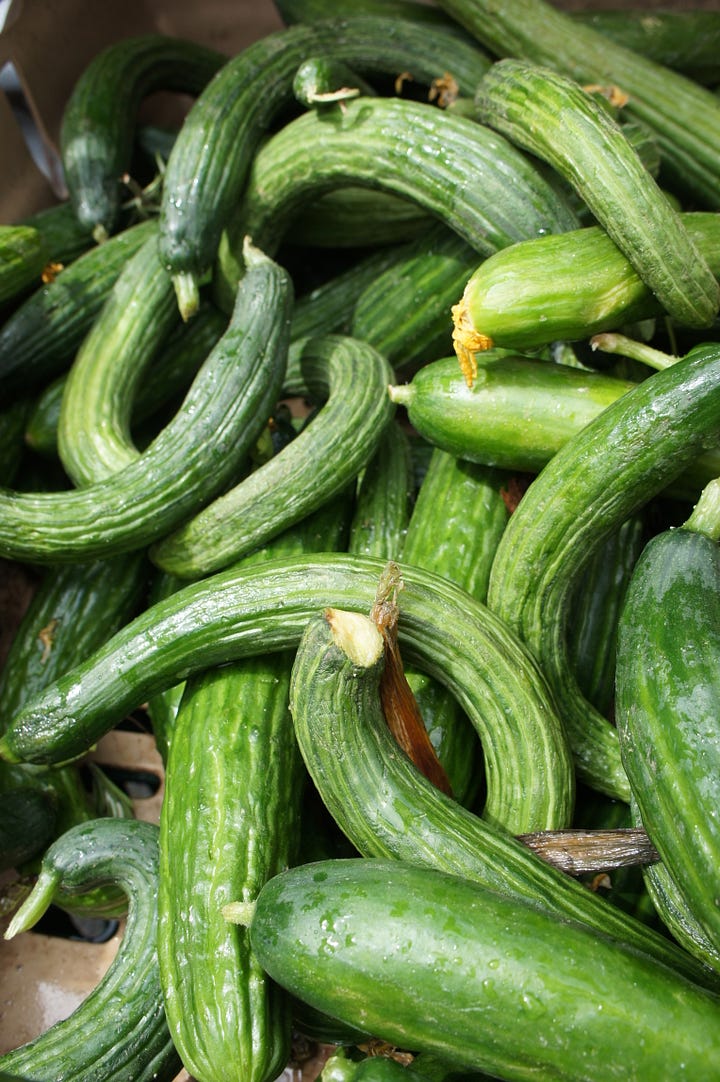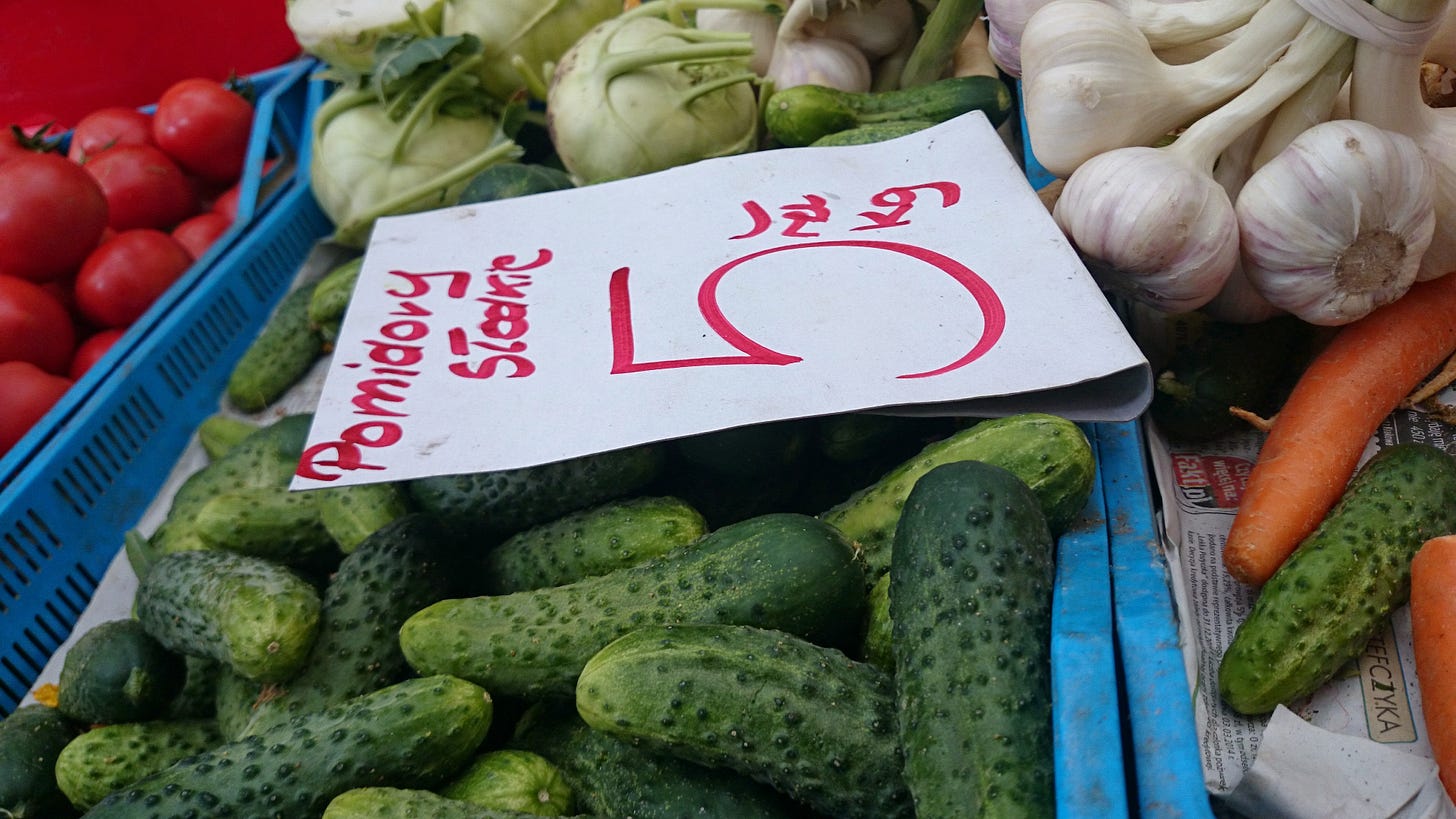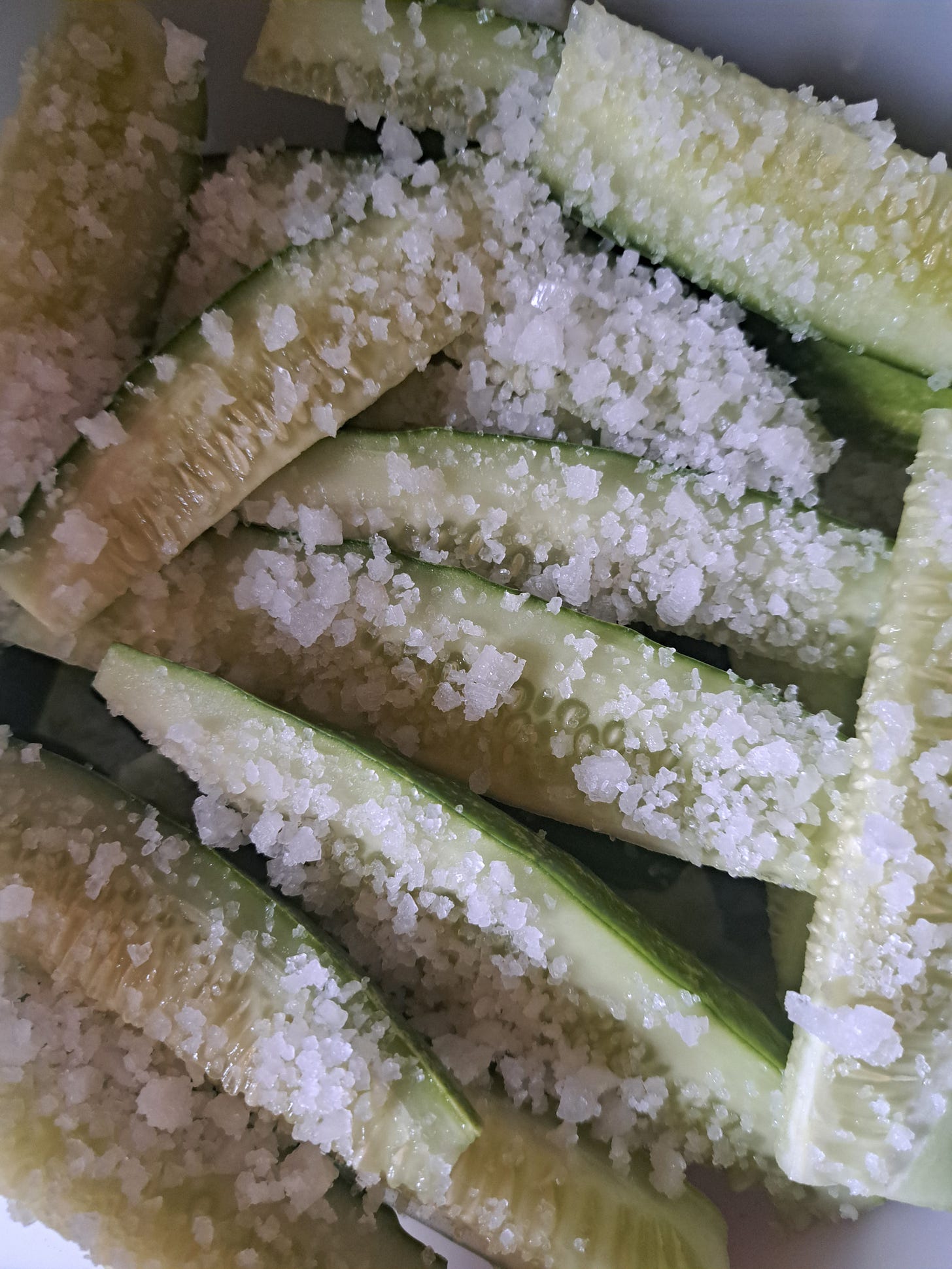Pickle Head; Consider the cucumber
When is a cucumber a gherkin? The varieties we deserve but don't get. 3 pickle recipes
Our crop of cucumbers has reached its zenith. Finally, the abundance and generosity of the vines means I can harvest enough to pickle. It’s like they’re apologising and making up for lost time. Of the many vines planted outdoors, only one survived. We’d arrive on site to find slugs making a home within a hollowed out cucumber and most plants were killed off within weeks of planting out. Those in the tunnel had better luck. I chose the seeds with care, picking varieties we’d never be able to buy commercially. I love seed stories, the names of the horticulture heroes who’ve saved varieties from extinction.

I'm addicted to new green cucumber pickles. Crisp & crunchy, garlicky with a hit of dill, they're an occasional expensive to buy treat. It’s a favourite memory; heading down the road to the Jewish deli on a Sunday morning where deep barrels of cucumbers swam in their murky brine, ready to be speared and taken home. Cucumber pickles need crooks, those thin, crisp, curvy cucumbers found at Greek or Turkish grocers, Lebanese cucumbers or small gherkin type cucumbers (look for them in Polish or Lithuanian stores, farmers markets or grow your own.)
I used to think that crooks were a variety of cucumber. Now I know, after years of trying to find the seed that they're the rejects, the ones that usually get away. There have been many stories written about the fact that we only get one variety of banana exported to our shores. The same seems to happen with cucumbers. We usually only find one variety in our supermarkets, and it doesn’t represent cucumbers at their best.1 2
Considering that cucumbers have been with us for many years; since the 14th Century in Britain, it’s a shame that when we consider a cucumber, only one type is commercially grown for supermarkets. There’s nothing wrong with them for a cucumber sandwich, a quick pickle or to liven up a gin and tonic. Occasionally you’ll find smaller, Persian cucumbers or baby cucumbers often sold as snacking cucumbers, aimed at children.




Pickled cucumbers are at the heart of many cultures. An Eastern European thing, a Jewish thing here in the UK and in America, brought to the shores by immigrants. In the wonderful 1988 film, Crossing Delancey, the hero is a pickle seller on the Lower East side, a street famous for pickle sellers. Now there is just one left and yes, I’ve visited, wishing more than once that they had a London outpost.
In the UK, this understanding has been slower on the uptake. Growing up, my friends wrinkled up their noses at the slices of pickles in their burgers and disdainfully threw them on the ground unless I was fast enough to say that I’d have them. To my mind they were often the best bit. What we knew as pickled cucumbers were dismissed derisively as gherkins. I could understand if these pickles were sharp, too vinegary but burger slices, like bread and butter pickles, are sweet.
When is a cucumber a gherkin and is a gherkin a cucumber? According to the OED, the earliest known use of the noun gherkin is in the mid 1600s. The earliest evidence for gherkin is from 1661, in a diary entry by Samuel Pepys, naval official and diarist.
Gherkin is a borrowing from Dutch gurkkijn. Several sources say that the word means pickled cucumber. And correct me if I’m wrong American readers, in the US, when someone mentions a pickle, it’s taken as read that it’s a pickled cucumber.

Is it just the British who have a misunderstanding with pickled cucumbers?
In the US pickles can be sour, three quarter sour, half sours, kosher kill or new, but either way, the pickling mixture used is brine, or vinegar, or both. And then there’s bread and butter pickles.
My mum’s recipe for making new green pickled cucumbers was one of those never written down, I just make it up as I go along methods. I can remember her adding and tasting, adding and tasting until the mixture was to her liking. The pickles were always made in an old glass sweet jar as follows.
Fill a glass sweet jar 3/4 with cold water. Add acetic acid a spoonful at a time, plus enough salt & sugar. Keep tasting until you have a salt, sweet, sour & acid balance.
Add washed whole crook cucumbers; throw in pickling spice, garlic cloves & a sprig of dill optional.
Screw lid on & put in a dark place for about a week then taste. Keep tasting until ready. Should keep for a few weeks.
Whenever I tried this, my mixture would go off within a week. I now use a mixture of brine & vinegar, smaller jars and store in the fridge. I do not use acetic acid. So far the cucumbers have kept beautifully although the colour isn’t as fresh and green as I’d like. More experiments with lacto fermentation lie ahead.
I’m giving you three different recipes for pickling. The last two don’t pre-salt the cucumbers which in my opinion keeps them crunchy. Do make sure that you rinse the cucumbers thoroughly or the resulting pickle will be overly salty.
This first recipe is the one I followed but in hindsight, next time I will try using Thom Eagle’s proportions for the pickling liquid; 250ml of water to 750ml of vinegar – with around 30g of sea salt and 100g of sugar to each litre. Read this if you’d like to try pickling in brine instead of vinegar. If you want to give acetic acid a go, it was used to speed up the pickling process and I’ve been told, adds to the flavour. Store it carefully. You’ll find it online and in kosher food shops.
Whichever method you use, make sure glass jar lids are coated, with no damage or scratches.
Put your jars and lids in boiling water and soak thoroughly. Empty the jars and put them upside down in the oven for 10 minutes at 100 degrees C to dry.
Pickled cucumbers
1 kilo of cucumbers (makes enough to approximately fill a 1.5 litre jar.)
Slice your cucumbers lengthwise into spears or into two if small. Put in a plastic or glass container and layer with coarse sea salt. I used around 100g. Cover and leave for a couple of hours or over night until you can see brine in the dish. Rinse thoroughly and use as below.
Bring to a boil until sugar and salt has dissolved, and leave to cool:-
750 ml white distilled vinegar
100 grams sugar
30 grams sea salt
1.5 tablespoons pickling spices.
1 teaspoon mustard seeds
4 bay leaves
Pack cucumbers tightly into a jar, adding between the layers;
A few sprigs of dill
2 cloves of garlic peeled and sliced.
Pour the vinegar mixture over the cucumbers, seal the jar and put in the fridge for a week. Test to see if they’re done to your liking. They may need another few days.

New Green Cucumbers
Fresh crooks, about 15
Water
50g pickling salt
25g sugar (optional)
a dried chilli
Whole peppercorns
Mustard seeds
Whole garlic cloves (peeled)
A fresh dill sprig
Distilled white vinegar
Glass Jars
The salt you use must be without additives; sea salt is fine if you can’t find pickling salt. How many cucumbers you use depends on the size and number of your jars.
In a large pan, combine a litre of water, 2 oz of salt, and 6 tablespoons white vinegar. Include 25g of sugar if you want a sweet/sour flavour. Bring the mixture to a boil until all the salt and sugar has dissolved. Taste and add more sugar or salt if you like.
In each sterilized jar place: one large sprig of dill weed, a dried chilli, 3 cloves garlic, a few black peppercorns and a handful of mustard seeds.
Wash the cucumbers in cold water, pack them carefully into your chosen jars and pour in the hot vinegar mixture to within 1 inch of top.
Seal the glass jars and store out of the light for at least 2 weeks. Once you've opened and tasted, keep in the fridge.
Ozer’s Cucumbers
Ozer won for the best pickles at my local flower and produce show last year. This is his recipe which should be enough, as with the first recipe, to fill a 1.5 litre jar.
1.2 kg small cucumbers
1 garlic clove thinly sliced
70ml water
300ml white vinegar (or cider vinegar)
120gr sugar (less sugar if desired)
1 tbsp coriander seeds (or mustard seeds)
1 tbsp black peppercorns
1 tbsp sea salt
(add any other spice if desired)
fresh dill
Method
Cut ends of cucumbers and slice lengthways
Mix ingredients in a pan, bring to simmer to dissolve sugar and salt to make brine
Pack cucumbers and dill in a jar and add brine
Store in fridge for 3-5 days
Do you have any pickle recipes to share?
The Lea Valley Growers Association were intending to ask for PGI status for their cucumbers.
I have asked The Cucumber and Pepper Growers Association why this is. I’m waiting for a response.







Thanks!! Going to have a go at these. I only recently realised that cukes aren't "just water" as some people dismissively used to tell us, but that they're nutritionally useful. Duh. And of course. Such an easy way to add an extra veggie, a crunch, a flavour, too.
I should share some of the Ukrainian pickle and salad recipes with you! Wonderful cucumbers there especially in Odesa and Kharkiv regions